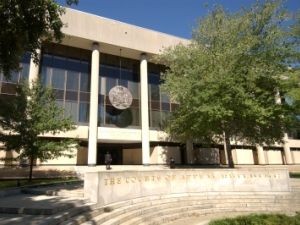Two companion uninsured/underinsured motorist cases out of Cecil County were decided by the Maryland Court of Appeals last month. The take home message for Maryland lawyers handling  uninsured motorist cases: if you don’t follow the rules by settling with the underlying carrier, the court will not let you off the mat. It is the ultimate in form over substance. I disagree with the law, but I can’t quibble with the court’s 6-1 decision. Really? Insurance companies should not be trying to eviscerate insurance agreements with their own clients, because their lawyers screwed up.
uninsured motorist cases: if you don’t follow the rules by settling with the underlying carrier, the court will not let you off the mat. It is the ultimate in form over substance. I disagree with the law, but I can’t quibble with the court’s 6-1 decision. Really? Insurance companies should not be trying to eviscerate insurance agreements with their own clients, because their lawyers screwed up.
Both cases, Woznicki v. General Insurance Company and Morse v. Erie Insurance Exchange involved the typical scenario; in which the tortfeasor’s liability insurance tenders the policy and the plaintiff’s attorney accepts, while intending to make an uninsured motorist claim. This is a special set of facts. Here, the insured’s UM policy explicitly stated that they had to bless any settlement with the tortfeasor’s liability insurance carrier — or pony up the policy themselves — to activate the UM coverage after a release was signed.
The Cases
In the first case, Woznicki, the victim had GEICO UM coverage. The insurance company required notification and consent from GEICO of any settlement that would exhaust the tortfeasor’s liability insurance limits. Plaintiff sues the other driver, who agrees to settle for policy limits.
Here’s the problem: on the same day she settles, her attorney sends a letter to GEICO saying that the tortfeasor had limited coverage, nothing else. A few months after the settlement with the liability carrier (Nationwide), they allegedly received oral permission from GEICO to settle via a phone call from a claims adjuster. This is not the law. But they follow up with a letter that says that the claim against Nationwide has been “tendered,” and ask for permission to settle that they already settled.
Ask for forgiveness, not permission, right? Coffee mug adages can let you down. GEICO rejects their letter, claiming that the “consent to settle” term of their policy was not followed, thus they cannot provide any UM coverage. Plaintiff filed a breach of insurance contract. GEICO successfully moves for summary judgment.
In granting summary judgment, the trial judge makes three important points which serve as the basis of the appeal: 1) The terms of the insurance policy and Maryland law were not adhered to by the plaintiff (by excluding GEICO from settlement negotiations with Nationwide); 2) The alleged phone conversation between Plaintiff #1’s attorney and the GEICO adjuster did not waive GEICO’s right to be informed of the settlement and 3) GEICO did not have to show prejudice caused by Plaintiff #1 failing to obtain consent to settle against the liability carrier.
The second case, Morse, is similar except that her attorney sent the request for permission to settle to the wrong address. While this blunder was getting sorted out, the Plaintiff became impatient and accepted the full value of the tortfeasor’s liability coverage. Once again, the UM carrier (Erie in this case) denied UM coverage and won at trial and again on appeal when COSA said that “obtaining consent to settle is not the equivalent of providing notice,” only the latter of which was done here.
Compliance with MD Settlement Procedure
Judge Greene wrote the majority opinion for a court that ruled in favor of the GEICO/Erie. After a brief history lesson about UM coverage in Maryland — one that is worth reading — the court dove into what this case is really about: compliance with two insurance statutes and the rationales behind them. Judge Greene was up front about the purpose of the UM insurance statutes: to protect an injured person’s right to make a claim against the liability carrier AND the UM carrier, something that was often difficult prior to the enactment of the two statutes at issue here. Those statutes, Md. Code Insurance, § 19-511 and § 19-110, lay out the procedure that Plaintiffs should have adhered to when settling their liability claims. Namely, notifying and obtaining consent from the UM carrier before accepting a settlement from the liability carrier.
Waiver
Generally, whenever the legislature sets out a complex statutory procedure that requires many hoops to be jumped through in a meticulous manner, the jumpee can usually do something to waive those requirements for the jumper. That was a big question here: before figuring out if GEICO waived it’s rights under § 19-511, could they even do so in the first place? GEICO, of course, argued no, suggesting that allowing waiver would “wreak havoc” upon Maryland’s insurance scheme. These insurance companies are always convinced that we are on the brink of chaos.
The Court disagreed, pointing out that the rationale behind § 19-511 (expediting recovery for a victim) is consistent with permitting waiver. There is no reason the doctrine of waiver would not apply here.
But the court found that GEICO then waived their rights under § 19-511. The court noted that waiver analysis is incredibly fact-based, meaning summary judgment is usually an improper vehicle to resolve a waiver dispute. Still, sometimes waiver can be so blatant, or so lacking, that summary judgment is appropriate.
That is what we have here. Woznicki relied upon a deposition of her trial counsel, pointing out that he allegedly alerted GEICO about the settlement with Nationwide. Here’s the kicker though, he didn’t even know about the requirements of § 19-511. He only corresponded with them about the Nationwide settlement because he  was from Delaware and that was “his practice” there. Essentially, the Plaintiff’s argument was that trial counsel accidentally got GEICO to waive their rights under § 19-511 and their policy. All the while, he was neither aware of nor sought the required consent from the GEICO. The whole thing is just silly.
was from Delaware and that was “his practice” there. Essentially, the Plaintiff’s argument was that trial counsel accidentally got GEICO to waive their rights under § 19-511 and their policy. All the while, he was neither aware of nor sought the required consent from the GEICO. The whole thing is just silly.
In the end, the Plaintiff’s counsel was really relying on trial counsel’s subjective understanding of a phone call to GEICO that may or may not have happened, obviously not enough to show the “mutual knowledge and acceptance” needed to prove waiver. So what is the takeaway here? You need cold hard facts to prove that the UM carrier waived its rights under § 19-511. Should you get permission to settle, get it in writing with explicit reference to the statutes and insurance policy.
Pride and Prejudice
GEICO and Erie denied UM coverage to the Plaintiffs because they didn’t adhere to the procedure laid out in § 19-511. The plaintiffs thought that rule defeated the purpose of our uninsured motorist statutory scheme.
This is true. This example of form over substance is not what the legislatures had in mind when drafting this legislation. But Judge Greene, writing for the court, really didn’t look much further than the statute to answer this question. He noted that § 19-511 does not contain a prejudice requirement; it doesn’t reference § 19-110, and applying the prejudice rule just makes little sense given the strict procedural guidelines. Looking to the intent and the broad scheme of this is all very good, but it does not circumvent the plain meaning of the statute.
I’m inclined to agree. Judge McDonald, bless him, disagreed with the prejudice question. His argument that just because the prejudice rule is not mentioned in § 19-511 does not mean insurers are relieved from showing it. He also argues that this is a cop-out of sorts that allows insurers to escape responsibility.
Under the Majority Opinion, the UM insurer escapes its obligation to pay UM benefits entirely without any need to show that it suffered any disadvantage from the failure of its insured to obtain a timely consent to the settlement with the liability insurer. This is a windfall to the insurer and a trap for the insured.
I agree. Wholeheartedly. As a plaintiffs’ lawyer, I’m 100% with him. But as an insurance law professor, I’m not sure I agree with imputing a prejudice requirement into the statute, particularly in this case, where the law is so clear and so easy to follow.
The Big Picture
These cases underscore why you better hire a lawyer who knows what they are doing. Stating the obvious, these Plaintiffs have an open and shut legal malpractice cases. This is not one of those cutting edge rules: everyone who handles auto tort cases in Maryland knows how to deal with this issue.
One of the lawyers, in this case, was a Delaware lawyer. Boy, it is tempting when you get a case that you know has money attached to it even if it is outside your jurisdiction. But when you do it without the help of local counsel, you are playing with fire.
Personal Note
I have not been blogging as much as usual. I only have so much time to dedicate to our online presence and much of that has been spent working on our newly vamped website. It looks great — please go check it out. But parts of it need some actual work and we want it to be the best free online resource for plaintiffs’ lawyers. The answers to the problems that plagued these lawyers in these cases could have been avoided if they had just used the sample documents in our Help Center. My goal for this summer is to get up a few posts each week that hopefully will entertain and educate. I watch the numbers of how many people read this blog and I really am grateful to those who read this blog regularly. Thank you.
 Maryland Injury Law Center
Maryland Injury Law Center

